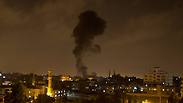
IDF strike in Gaza. Both sides declare they're not interested in escalation, and the fire increases
צילום: AFP
The Middle Eastern paradox: If you want peace, prepare for war
Analysis: Israel made a strategic mistake by informing Hamas that it does not wish to hit it too hard. In Middle Eastern language, such a statement serves as an insurance policy for Hamas.
As I write these words, the surface-to-surface missile fire from the Gaza Strip is intensifying and increasingly expanding northward.
Here's a Middle Eastern paradox on a reduced scale: Both sides declare that they are not interested in escalation, and the fire increases. Understanding this paradox can also teach us a few basic rules about our situation in the Middle East.
Hamas' situation in the past few years is not what it used to be. The economic situation in the Strip is deteriorating, the population already understands that its salvation will not come from the Hamas leadership, and even salaries are barely being paid.
We must also remember what happened in Egypt to Hamas' ideological fathers, the Muslim Brotherhood, who were put behind bars. A conflict with Israel at this time looks almost suicidal. The rocket fire directed at Israel calls for a harsh response, which could lead to a real existential threat to the Hamas government.
So why do they continue to fire? Because they have an opportunity to prove to their audience (in the Strip) that "the resistance" goes on and that they are continuing to lead the war on the Zionist devil.
But what about the risk?
This is where Israel comes into the picture. It has no interest in destroying Hamas right now and bringing a new source of uncertainty into the Middle Eastern field, which is overflowing with uncertainty as it is.
Moreover, Israel made a strategic mistake by informing Hamas that it does not wish to hit it too hard. "We suggest that you calm down, and we promise that a clam will be met with a clam," its spokespeople said.
In Middle Eastern language, such a statement serves as an insurance policy for Hamas. In its ears it sounds like "we have no intention of entering the Strip, and so you are free to fire."
A dialogue of the deaf? Perhaps, but that's the regular dialogue in the deterrence doctrine.
If you want peace, the Romans said, prepare for war. In the cruel world we live in, Hamas won't stop firing out of "Zionist" motives. It's an enemy which wants to see us disappear off the Middle Eastern map. It will only stop if it fears for its existence.
We have at least come to our senses. The government understood the aforesaid and asked the IDF to prepare "for every possible option," including an extensive call-up of reserves required for entering Gaza.
It's reasonable to assume that the tables will now be turned: The fear of a ground operation (if it is backed by additional steps on Israel's part which will increase the credibility of deterrence) will lead Hamas to find a ladder and get off its high horse – in other words, to return to the relative calm we had here before. Until when? Until the next round in a year, two or more (depending on the strength of our blow).
This story may be generalized: What sustains us in the hostile world around us is neither a recognition that Israel's existence is justified, nor a Zionist vision shared by the region's nations. What sustains us is the knowledge that no one can overcome our force.
That is the reason, by the way, why we must keep the IDF strong even if the visible threats are growing weaker. It sounds like a paradox, but such a paradoxical situation is an inseparable part of strategy in general and of deterrence in particular. Damaging the IDF's force (and image) is the main reason why the threats will grow again.
Remember what the Romans said? If you want peace, prepare for war.










